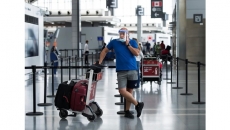With students and teachers preparing to return to classrooms across the country this month, experts say ramping up testing protocols is one way to help provide a safe transition back to school.
Some epidemiologists believe testing a group of COVID nasal-swab samples together — a strategy known as pooled testing or batch testing — might be a more efficient method for dealing with a large number of tests that could potentially be coming in.
Colin Furness, an assistant professor at the University of Toronto, envisions an ideal scenario where teachers would be tested for COVID twice a week. If that were to happen in Ontario, a province with roughly 160,000 teachers, Furness says labs would be processing more than 300,000 tests each week just on teachers.
"We don't really have the capacity to do that. And that is extremely concerning to me," Furness said. "So pooled testing would be one way of saying 'all right, we have an existing laboratory processing capacity. Let's multiply it.'"
Pooled testing works by mixing a number of samples together — Furness suggests eight — and screening them for the novel coronavirus at the same time. This could theoretically include a group of teachers working at the same school, or students and teachers in the same cohort.
If the pooled sample comes back negative, it likely means all the samples within the batch are negative.
If the batch tests positive, the lab would then re-test each individual sample from the pool to find the positive result.
This method works best in scenarios where you wouldn't expect to find many COVID cases, Furness said, but loses its effectiveness where prevalence of the virus is higher.
"If there's a lot of positive cases, you're not going to save much (time), because you're gonna have to go back and redo it all the time," he explained. "But if they're mostly negative, this becomes very, very fast.
"And it vastly increases the amount of testing you can do in the same laboratory space."
Winnipeg epidemiologist Cynthia Carr agrees that pooled testing is useful as a quick screening tool to rule out large numbers of people at once.
Pooled testing can also be cheaper, Carr says, since labs would use less reagent — the chemical that detects the virus on the swab — on a bigger sample.
"The reagent itself is expensive," she said. "So if you can use one reagent for every 10 people or so, you're cutting that down, unless there's a positive and you have to test them again individually."
Pooling can run the risk of diluting samples, however, which could lead to false negatives, Carr added. And more research may be needed to determine the exact number of samples you can mix together while still keeping the test reliable.
Canada's lab strategies vary from province to province.
B.C. and Ontario do not currently use pooled testing, though B.C. says it will consider the strategy if "the supply of reagents used for testing is at level where conserving this supply is warranted."
Public Health Ontario said in an email that pooled testing for COVID-19 is currently being "validated and examined by several laboratories."
Alberta, meanwhile, began a pooling test pilot last month through Alberta Precision Labs, a subsidiary of the provincial health services agency, for a small number of samples from asymptomatic patients. Alberta Health Services says it will "further expand the volume of pooling tests in weeks to come," if the pilot is successful.
Education and health authorities are under pressure to implement testing protocols that would keep track of COVID-19 infections in schools. A Quebec teachers' union said Wednesday it's going to court to demand the government institute a rapid COVID-19 testing strategy in the school system and to divulge the number of infections among students, teachers and staff.
Using pooled testing as a proactive "ongoing monitor" of a school or classroom cohort is tricky, Carr said, because it would require parental permission and plenty of resources to collect that many swabs on a regular basis.
"We've got to be careful. It wouldn't mean replacing physical distancing or letting down our guard in any other way," Carr said. "But it would be a potential addition to learning about the prevalence in the population."
Furness says pooled testing could theoretically help in dealing with a small outbreak before it gets out of hand in a school setting by taking samples from an entire class or cohort after exposure has been detected.
But, he added, if COVID has spread into several positive cases within one classroom, "pooled testing wouldn't actually save any time."
Pooled testing is not new, and Carr and Furness both say it's been used effectively in the past in detecting HIV and other viruses.
While there have been times pooled testing has not been effective — Carr pointed out that soldiers were unsuccessfully tested for syphilis using this method during the Second World War — she added that technology has "come a whole long way since then."
"There's more recent examples where it really does seem to assist in quick turnaround time, in alleviating pressure on the health-care system, and in leveraging materials that are in shorter supply," she said.






